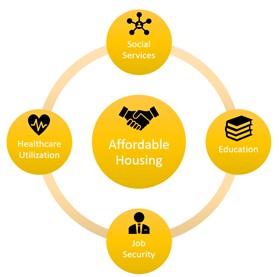This blog was written for the RSA Blog Student Summer Series that will highlight graduate student success in regional studies across the globe throughout the summer.
The right to adequate housing is considered a controversial topic, with many people globally lacking this basic human right. In Canada, Bill-C-97 containing the “National Housing Strategy Act” was signed, recognizing housing as a human right. This political move displays a commitment to all Canadians to provide safe, affordable, and adequate housing. Yet, a major gap remains between this human right, and available accommodations.

According to Statistics Canada in 2018 almost 2% (approximately 284,000!) of households in Canada were on a waitlist to access social housing. This clearly displays an issue between affordable housing supply and demand in Canada. But what if we begin to consider the economic benefits affordable housing has on our community? It is time to prioritize affordable housing for the benefits it brings to individuals and our community, rather than focusing on the cost of implementation.
Benefits to Affordable Housing?
Research has begun to help us understand what the benefits of providing affordable housing are in our community. With this information, we can attempt to value these contributions, using them to inform decision making. Previous research for the Canadian Policy Research Networks has called for a standard set of indicators to be created, to help uniformly value projects in the affordable housing space. My current research seeks to build a framework which will be proposed to measure the impact of affordable housing projects on our communities. This will allow stakeholders to report on the true value of housing projects, advocate for additional funding, and efficiently allocate funding with the goal of improving the housing quality for tenants. This will help stakeholders display affordable housing as more than an expense by shedding light on benefits that are typically unmeasured. Here we can change the stigma associated with affordable housing being expensive, to a series of untapped benefits within our community.

Shifting the way we think about affordable housing is a large ask. Affordable housing does, of course, cost money. So, what are the economic benefits that need to be considered in our calculation? Research has suggested a range of benefits which can be tied to economic benefits on the broader community. Some examples include benefits to education, job security, and healthcare utilization. There are many other benefits which are dependent on the priorities of the project, as well. These concepts drive the “housing first” approach, which acknowledges that people are better able to move forward with other aspects of their lives once housed. Once an individual accesses housing, they can access other support services to access things such as employment, mental health support, and education.
Example: Participation in the Workforce
Let’s look at a few benefits of affordable housing, as it relates to participation in the workforce. A study by Desmond and Gerhenson (2016) concluded fixed housing plays a role in whether an individual can maintain stable employment. Therefore, by providing affordable housing to an individual who was homeless or underhoused (for instance living in temporary accommodations or with friends) they may be able to access stable employment. Securing employment benefits the individual tenant and the overall community. One of the individual benefits include increased income either at a part-time or full-time rate, leading to financial freedom. For the broader community, an individual securing employment may result in reduced social services spending (such as avoided social assistance). Now, when we consider affordable housing as a catalyst to securing employment, the potential economic benefits are clear. However, this is only one of many examples. A variety of other examples can be seen in other areas such as education and health care utilization.
Canada has recognized affordable housing a basic human right. It is time we act on this and provide adequate and affordable housing for all member of our community. We must shift our thinking from analyzing the potential costs of providing affordable housing, to recognizing the series of untapped benefits as it relates to our community.

Tatianna Brierley is a master’s student in the Sustainability Management program at the University of Waterloo. She is currently working on her thesis as it relates to valuing affordable housing through impact measurement in Ontario, Canada.
Are you currently involved with regional research, policy, and development? The Regional Studies Association is accepting articles for their online blog. For more information, contact the Blog Editor at rsablog@regionalstudies.org.